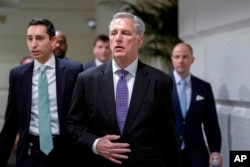President Joe Biden is meeting with Speaker Kevin McCarthy at the White House on Wednesday afternoon, the first in-person sit-down between the two leaders since Republicans assumed control of the House of Representatives following the November midterm elections.
The pair is set to discuss a range of issues including the urgent need to raise the nation's debt ceiling, the amount of money authorized by Congress for the government to borrow to meet existing spending obligations.
The United States hit the $31.4 trillion ceiling on January 19. Without an agreement, the country will for the first time go into default, potentially plunging the economy into a crisis.
Expectations of a breakthrough are low. The White House has drawn a hard line on negotiations, maintaining that debt ceilings should be lifted without conditions. The ceiling has been raised 78 times since 1960, including 49 times under Republican presidents and 29 times under Democratic presidents.

In a memo released earlier this week, National Economic Council Director Brian Deese and Office of Management and Budget Director Shalanda Young said that in the meeting with McCarthy, Biden will "seek a clear commitment" that defaulting on the nation's debt is off the table. They called on Republicans to present a detailed budget proposal specifying the spending cuts they target.
McCarthy and House Republicans say they are aiming to slash "wasteful spending in Washington" as part of a deal to raise the debt ceiling but have not formally identified the programs they want cut. Republicans broadly say they are aiming to slash domestic programs and reduce some defense spending while avoiding cuts to two social programs that voters from both sides of the aisle want protected: Medicare, the health insurance program for seniors, and Social Security, which provides payments to retirees and the disabled.
Under pressure
McCarthy is under pressure from members of the ultraconservative Republican Freedom Caucus who want to drastically limit the size, scope and reach of the federal government and budget, and reform Congress to make it easier to do so. Twenty lawmakers, most of whom are members of the caucus, withheld their votes for McCarthy's speakership through all or most of 15 ballot rounds earlier in January until he pledged to fulfil their procedural and policy demands, including enabling just one member to call for a vote seeking his ouster.
For many in Washington, the debt brinkmanship feels familiar. Republicans in Congress voted against increasing the ceiling under Democratic President Barack Obama in 2011 and 2013 but raised it three times under Republican President Donald Trump.
The government is expected to be able to keep operating until at least early June but it's not clear how long the Treasury Department can avoid defaulting on the debt. A default could lead to a global economic crisis, as many companies and foreign governments hold their capital reserves in U.S. Treasury notes.
In 2011, the threat of default downgraded the U.S. government's credit worthiness and led to major stock market crashes around the world.


